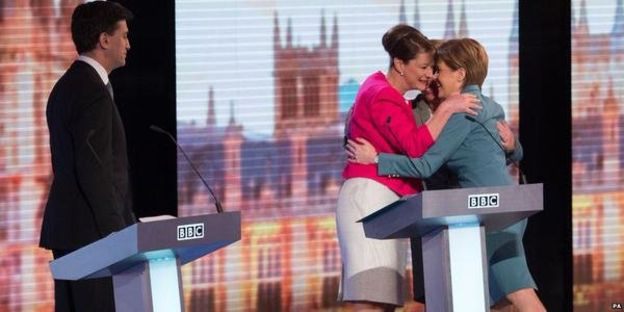The BBC has confirmed that the hand-picked audience for the opposition leaders’ debate was left leaning, despite claiming otherwise live on air.
Out of all the audience members who had declared a party allegiance, only three marked themselves down as UKIP out of a total of 22.
With five selected to represent the Conservatives, that means at best 36 per cent – just over a third – put their ideology as right-of-centre.
After persistent quizzing, the Daily Express managed to get the BBC and ICM to reveal how the audience members were chosen. It confirms that Nigel Farage was correct when he said those present at Westminster Central Hall were “a remarkable audience even by the left-wing standards of the BBC.”
Chairman David Dimbleby denied that claim. He said: “This is an audience that has been carefully chosen not by the BBC, but by an independent polling organisation to represent the balance between all parties.”
The audience was narrowed down to five supporters each for Labour and the Tories, four for the Liberal Democrats, three for UKIP, two each for the SNP and Greens and one for Plaid. In addition, one fifth of the audience was made up of ‘undecided voters’ from within a certain radius around Westminster.
This is not the first time the methodology of ICM, the polling company used by the BBC, has been challenged.
Before the 2013 county council elections, which were considered the break through for UKIP, ICM had the party at nine per cent. Weeks later it romped home with an average of 26 per cent of the vote where it fielded candidates.
And ahead of the European Elections, where UKIP were the decisive victors, ICM had the party on 11 per cent support; less than half of what they polled a month later.
Farage’s attack on the audience came after he was booed for his views on immigration.
Labour leader Ed Miliband told the UKIP leader, “It’s never a great idea to attack the audience, Nigel, in my opinion.” Farage replied “The real audience are sitting at home.”
However, statistics by Survation for the Daily Mirror after the debate showed the Conservatives did the best out of the night by not taking part, rising four percentage points, and of those present only Farage increased his party’s popularity, going up one point to 17 per cent.
Speaking after the findings, the UKIP leader said: “Sometimes these things go wrong, sometimes you get groups who apply to be on programmes who perhaps aren’t as truthful on their applications as they could be.
“In this case, the BBC gave the job to a polling company called ICM who are famous for getting everything about Ukip wrong and that I think was the mistake.”
And he told Breitbart London, “ICM got us wrong in 2013, wrong in 2014 and they’ve got us wrong again in 2015. The BBC needs to use a polling company with a better track record.”
“The night of the by-election that Douglas Carswell won in Clacton with a landslide, there was a Ukip representative – Patrick O’Flynn – on Question Time in Clacton and the audience were deeply hostile to him,” he added.
A spokesman from the BBC said: “All the broadcasters and the political parties agreed that the appropriate way to recruit audiences for debates was to ask a respected independent polling organisation to do the job on our behalf.
“That was the case for all the debates in 2010, for the Clegg/Farage debates last year, as well as for both the debates during this campaign – ICM has an established track record of recruiting the audiences for all these debates.”
ICM defended its recruitment process, saying it was “premised on orthodox random location selection techniques.”
It said 30 geographical areas were selected within a 20-mile radius of the venue, as well as a small number of SNP and Plaid Cymru supporters from Scotland and Wales.

COMMENTS
Please let us know if you're having issues with commenting.